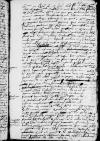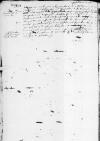Ex ⌊⌋ Dominationis Vestrae Reverendissimae ea, quae pro paterno suo in me amore ratione coadiutoriae me latere noluit, habunde intellexi, planeque in eo
Dominationis Vestrae Reverendissimae erga me propensissimam benevolentiam cognovi, qua mecum de omnibus sub vera paterna agit fiducia, non permittens me ignorare quicquam earum rerum, quas written over e⌈ess written over e⌉ usui et ex re mihi esse aliquando futuras esse arbitratur. Quemadmodum in litteris suis ad ⌊venerabilem dominum custodem Varmiensem⌋, quarum mihi exemplum misit, liquido declaravit. Ceterum, cum nesciam adhuc, immo et Dominatio Vestra Reverendissima, cuiusmodi articulorum[1] moderatio facta sit superinscribed in place of crossed-out esse debeat⌈esse debeatfacta sitfacta sit superinscribed in place of crossed-out esse debeat⌉, et quodque adscribed⌈queque adscribed⌉ ob id superinscribed⌈ob idob id superinscribed⌉, priusquam ⌊dominus custos⌋ cum ⌊suo collega⌋ ad me se conferat postulaverit ut, Dominatio vestra Reverendissima convenire written over at⌈atrere written over at⌉ debeat, videretur mihi, modo Dominationi Vestrae
Reverendissimae non displiceret, ut totum hoc negotium apud Dominationem
Vestram Reverendissimam tractaretur, ne foret opus quippiam in novam
consultationem aut superinscribed⌈autaut superinscribed⌉ ad ⌊capitulum⌋ referre. Quandoquidem, si quid eiusmodi in ipsis articulis [e]mergeret on the margin⌈e hidden by binding⌈[e]e hidden by binding⌉mergeret[e]mergeret on the margin⌉, quod consilio et declaratione Dominationis Vestrae Reverendissimae egeret, ne inter nos superinscribed⌈inter nosinter nos superinscribed⌉ infecta re discederetur, ad Dominationem Vestram Reverendissimam esset recurrendum. Interea vero,
cf. Adagia 1526 No. 2759 Ut nunc sunt homines ⌊ut nunc sunt et paper damaged⌈[t]t paper damaged⌉ homines, et temporacf. Adagia 1526 No. 2759 Ut nunc sunt homines ⌋, multa incidere possent, velit itaque non gravari Dominatio Vestra Reverendissima et superinscribed⌈etet superinscribed⌉ hanc que utcumque subire molestiam atque pro sua in me benevolentia ac paterno ... illegible⌈...... illegible⌉ amore permittere utcumque subire molestiam, ut ipse possim unacum ⌊domino custode⌋ et ⌊collega eius⌋ coram Dominatione Vestra Reverendissima constitui transigereque omnia. Venturus quidem sum paucis comitatus, resque haec Deo duce bene on the margin⌈Deo duce beneDeo duce bene on the margin⌉ cepta multo facilius et solidius ad eum modum praesente Dominatione Vestra Reverendissima moderarique conficique poterit. Mitto igitur, ut sim de mente ms. mence(!)
⌈mentemente ms. mence(!)
⌉ Dominationis Vestrae Reverendissimae in iis certior, hunc meum nuntium. Quod non inivissem consilium, nisi quaedam essent et in litteris Dominationis Vestrae Reverendissimae atque etiam⌊domini custodis⌋ inessent litteris, quae me ad Dominationem Vestram Reverendissimam pertrahunt, quam etiam iam a multo tempore [o]b causas [p]lurimas et necessarias on the margin⌈o hidden by binding⌈[o]o hidden by binding⌉b causas p hidden by binding⌈[p]p hidden by binding⌉lurimas et necessarias[o]b causas [p]lurimas et necessarias on the margin⌉ sanam et felicem videre cupimus. Accedit, quod interea etiam nuntius meus redibit ex ⌊Cracovia⌋, qui recta ad Dominationem Vestram Reverendissimam advolabit superinscribed, in the hand of other⌈advolabitadvolabit superinscribed, in the hand of other⌉, ubi tum, Deo auspice, futurus sum advolabit. Quem, ut eandem Dominationem Vestram Reverendissimam quam diutissime incolumem prosperrimamque conservet, precor ex animo.
 BCz, 244, p. 214
Scripserat mihi ante aliquot dies Dominatio Vestra Reverendissima
postulans certior fieri superinscribed⌈postulans certior fieripostulans certior fieri superinscribed⌉, quomodo negotium
BCz, 244, p. 214
Scripserat mihi ante aliquot dies Dominatio Vestra Reverendissima
postulans certior fieri superinscribed⌈postulans certior fieripostulans certior fieri superinscribed⌉, quomodo negotium 
